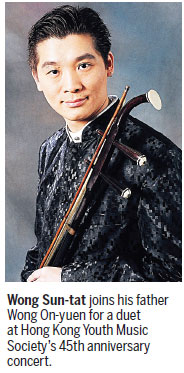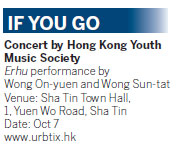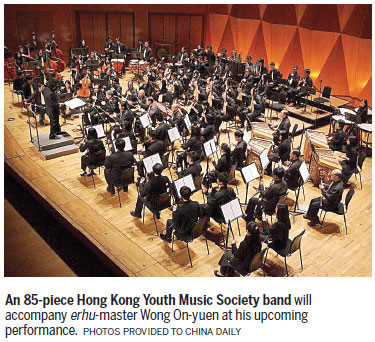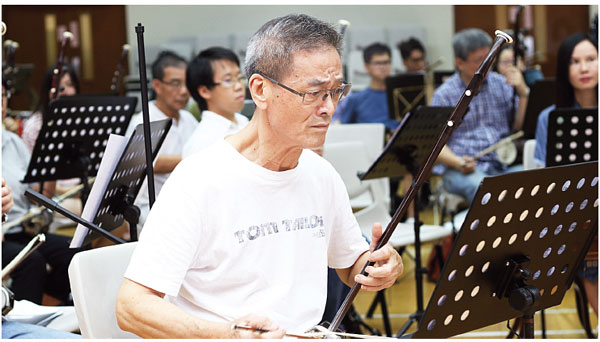Return of the erhu-dite man
Updated: 2018-09-28 07:11
(HK Edition)
|
|||||||
Doyen of erhu music Wong On-yuen will give his first public performance in 10 years at the 45th anniversary concert of Hong Kong Youth Music Society. Wang Yuke caught up with the maestro.
Renowned erhu artist and former concert master of Hong Kong Chinese Orchestra Wong On-yuen returns to the stage on October 7 after a 10-year absence. This could be one of his last public performances.
During his quiet decade, Wong declined all invitations to perform. "I've played music for more than half my life and wanted to do other things that I also enjoy, such as collecting antique watches," says the musician, now in his 70s. However, he couldn't resist the invitation from the Hong Kong Youth Music Society (HKYMS) - an organization Wong shares a sustained bond with - to perform at their 45th anniversary concert. He convinced his son, the Singapore-resident Sunny Wong Sun-tat to join him on stage in Hong Kong for the event, - "Boundless Stringed Rhythm and Beat". Wong junior is head of Chinese Instrumental Studies at the Nanyang Academy of Fine Arts and former gaohu deputy principal of the Singapore Chinese Orchestra.

The father-and-son duo will premiere The Song of My Hometown, composed by Wong Hok-yeung 10 years ago. The master erhu-player is very pleased with the eight-minute concerto which, he says, captures his deep love and nostalgia for his hometown. "I requested Hok-yeung to compose a piece based on a nursery rhyme that every child knew by heart when I was young," he says, humming the tune. The lyrics, written in the Sichuanese dialect, speak of people's wishes for a long life and celebrate the spirit of teamwork as epitomized by yellow ants.
"He accurately translated my nostalgia for my hometown (Chongqing) into music," says Wong of his former student. However, as "different people listening to the same song have nuanced interpretations and understanding of it," the master musician would prefer his audience to approach his performance their own way.
The song will be performed on the erhu and zhonghu or alto erhu, accompanied by the 85-piece HKYMS band playing pipa, flute, sheng (Chinese mouth organ), suona (double-reeded horn), yangqin (Chinese hammered dulcimer), guzheng (Chinese zither) and cello.
Wong says the pairing of erhu and alto erhu or erhu and treble erhu (known as gaohu) is more expressive than combining two typical erhu instruments for a duet. The zhonghu sound is deeper and richer while the gaohu is high-pitched and crisp. In The Song of My Hometown, Wong and his son will present a harmony of zhonghu and erhu, with the former conjuring up a feel of the old times, befitting the theme of the concert. The song starts with a slow tempo, setting the tone for reminiscence, speeds up along the way to suggest bubbly, carefree childhood, followed by a fiery cadenza without orchestra accompaniment which alludes to the city's transformation and the march of time.
The duo will also play the concert finale - a medley of Cantonese music played on Chinese string and wind instruments adapted from the popular Guangdong Yue Qu form. Retaining the melodies typical of Cantonese music, the commissioned piece accentuates the musical dialogue between the father-son duo and the band and is aimed at younger audiences.
The repertoire also includes Fishermen's Triumphant Song, Full Moon and The Yellow River Cantata - all popular and familiar numbers, composed in the last century.
Wan Cheuk-fung, external affairs coordinator of HKYMS, says the compositions selected to play at the event vary in rhythm, tempo, and mood, evoking memory and sorrow, ambition and hope, or national pride and patriotism, even as they consistently serve the purpose of the concert, which is to help make the stringed music tradition endure.
It runs in the family
The father and son are not new to playing together, and have a feel for each other's playing styles that grew from the erhu lessons Wong junior received from his father. Rather than teaching his son theories and techniques, Wong preferred to "let him feel". "I played a few notes, then he emulated. Over time, he got accustomed to and picked up my playing styles," Wong said.
To achieve the perfect unity in a duet, "the pair should have a uniform grasp of the music and thus an identical mood and sense of the piece of music," he reckons.
The generation gap between Wong and his 43-year old son does not stop them from bouncing ideas off each other. "The age gap never affects our collaboration, as we respect each other's music," says Wong senior.
He believes young players are much savvier than their older counterparts when it comes to playing diverse music genres. "They have a brilliant command of exotic genres, such as jazz, blues, and pop music and we can't catch up with them," admitted Wong, who believes that incorporating these newer music styles in a concert played with traditional instruments can give it a lift.

Wong has plans to retreat from the limelight, safe in the knowledge that the wave of young talents is competent enough to carry on the tradition of erhu music. He says many local young erhu amateurs can compete with professionals from the Chinese mainland, and some youngsters from Taiwan, Singapore and other parts of Asia are accomplished enough to perform challenging erhu repertoires even without having formally trained in the art form.
He has performed with musicians from professional institutes but feels closer to amateur musicians in spirit. "They pursue music purely out of fascination. That's probably why amateurs appear to be more enthusiastic, humble and motivated to learn than some professionals."
"Doing music as well as other art forms requires pure intention and full commitment," says Wong. He believes it is this lasting fervor that enables music traditions to be passed down the generations.
|
Erhu player Wong On-yuen’s comeback performance is in remembrance of his young days spent in Chongqing. |

(HK Edition 09/28/2018 page13)
